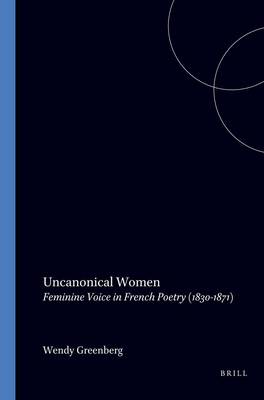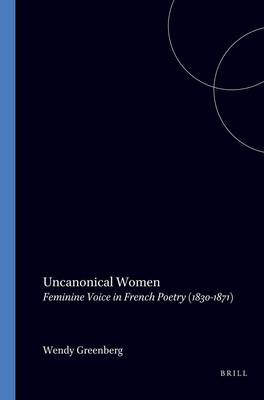
- Afhalen na 1 uur in een winkel met voorraad
- Gratis thuislevering in België vanaf € 30
- Ruim aanbod met 7 miljoen producten
- Afhalen na 1 uur in een winkel met voorraad
- Gratis thuislevering in België vanaf € 30
- Ruim aanbod met 7 miljoen producten
Zoeken
Omschrijving
In English here is presented for the first time an examination of the text and context of five nineteenth-century French women poets: Elisa Mercoeur (1808-1835), Marceline Desbordes-Valmore (1786-1859), Louisa Siefert (1845-1877), Louise Ackermann (1813-1890) and Louise Michel (1830-1905) will demonstrate that in spite of mentoring by various literary, historic or even family figures, these writers found their own voices. A striking example is Louisa Siefert, who in spite of bold intertextuality, displays an unmistakably feminine persona, whose originality poignantly draws the reader's attention. These poets had many obstacles of overcome as woman-identified poets. For example, Louise Ackermann's own husband did not want her to write, and for this reason, she remained silent during her who years of marriage. Louise Michel is a different case as an analysis of the short poem Bouche close (Le Livre du Bagne, 1873-1880) will demonstrate. In short, Uncanonical Women, explores a crescendo of poetic voice, from the initial timid solicitations of Elisa Mercoeur, to the bold, self-sufficient defiance of Louise Michel. The implication of my original findings that uncanonical poets can surpass cultural marginalization is that the book will target both a traditional and modern readership. Major these and clear language and tools that delineate identifiably personal style of true writers and the poetic persona of each is unique: Mercoeur in ambition, Desbordes-Valmore in domesticity, Siefert, in anguish, Ackermann in pessimism and Michel in leadership.
Specificaties
Betrokkenen
- Auteur(s):
- Uitgeverij:
Inhoud
- Aantal bladzijden:
- 184
- Taal:
- Engels
- Reeks:
- Reeksnummer:
- nr. 9
Eigenschappen
- Productcode (EAN):
- 9789042005327
- Verschijningsdatum:
- 1/01/1999
- Uitvoering:
- Paperback
- Formaat:
- Trade paperback (VS)
- Afmetingen:
- 150 mm x 220 mm
- Gewicht:
- 326 g

Alleen bij Standaard Boekhandel
+ 192 punten op je klantenkaart van Standaard Boekhandel
Beoordelingen
We publiceren alleen reviews die voldoen aan de voorwaarden voor reviews. Bekijk onze voorwaarden voor reviews.











